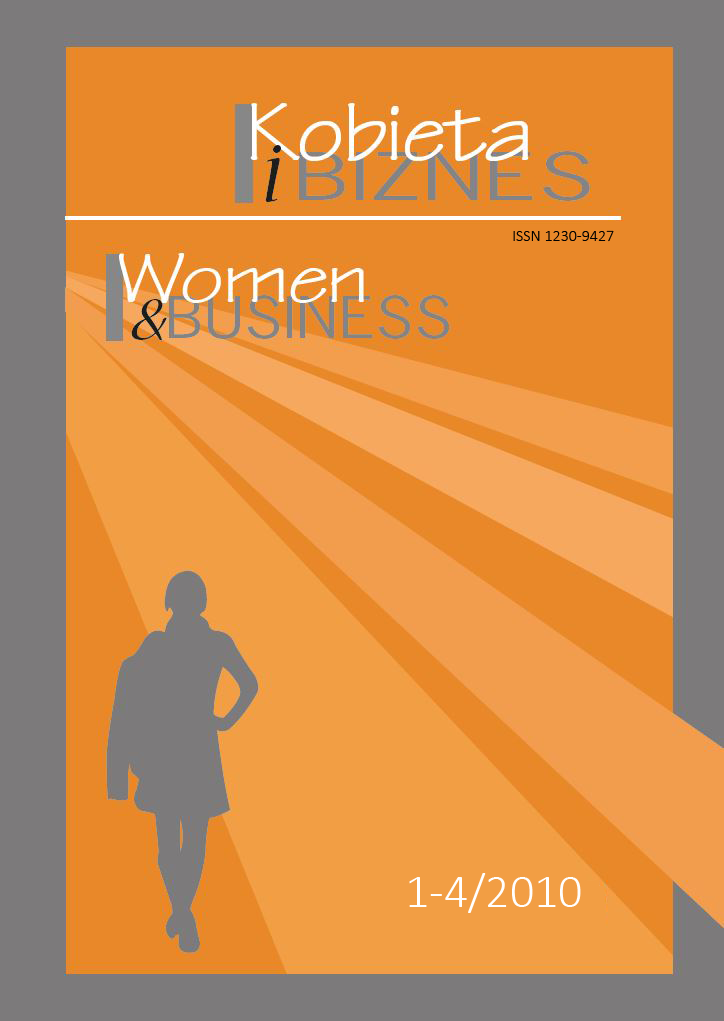Uwarunkowania kariery zawodowej kobiet w Turcji
##plugins.themes.bootstrap3.article.main##
Abstrakt
Jak pokazały omawiane wyniki badań, pozycja zawodowa kobiet tureckich jest wynikiem zarówno uwarunkowań zewnętrznych (kultury organizacyjnej, stereotypów funkcjonujących w społeczeństwie na temat kobiet), jak i wewnętrznych (postawa samych kobiet i ich najbliższych). Z jednej strony w tureckich fi rmach istnieje zrozumienie dla rodzinnych potrzeb kobiet, ale z drugiej tradycyjny sposób myślenia faworyzuje mężczyzn w osiąganiu wyższych stanowisk. Wiele z problemów, jakie napotykają Turczynki jest wspólnych dla kobiet na całym świecie. Postrzega się je często przez pryzmat atrakcyjności fi zycznej, a nie kompetencji lub wymaga się dostosowania do "męskiego" sposobu funkcjonowania w organizacji. Istnienie trudności nie oznacza jednak, że kobietom nie udaje się robić kariery zawodowej. Coraz więcej Turczynek zajmuje wysokie, odpowiedzialne stanowiska. Warto zauważyć, że wspólną cechą kobiet menedżerek jest pewność siebie, niezależność i determinacja w osiąganiu zamierzonych celów. Jeśli kobieta wierzy w swoje możliwości, to łatwiej przekona do siebie podwładnych, przełożonych i partnerów biznesowych. Turczynki, które odniosły sukces, swoją postawą przekraczają stereotypowe przekonania, pokazują, że można połączyć życie rodzinne z karierą zawodową, być dobrą żoną, matką i bizneswoman.
##plugins.themes.bootstrap3.article.details##
Autor (Autorzy) artykułu oświadcza, że przesłane opracowanie nie narusza praw autorskich osób trzecich. Wyraża zgodę na poddanie artykułu procedurze recenzji oraz dokonanie zmian redakcyjnych. Przenosi nieodpłatnie na Oficynę Wydawniczą SGH autorskie prawa majątkowe do utworu na polach eksploatacji wymienionych w art. 50 Ustawy z dnia 4 lutego 1994 r. o prawie autorskim i prawach pokrewnych – pod warunkiem, że praca została zaakceptowana do publikacji i opublikowana.
Oficyna Wydawnicza SGH posiada autorskie prawa majątkowe do wszystkich treści czasopisma. Zamieszczenie tekstu artykuły w repozytorium, na stronie domowej autora lub na innej stronie jest dozwolone o ile nie wiąże się z pozyskiwaniem korzyści majątkowych, a tekst wyposażony będzie w informacje źródłowe (w tym również tytuł, rok, numer i adres internetowy czasopisma).
Osoby zainteresowane komercyjnym wykorzystaniem zawartości czasopisma proszone są o kontakt z Redakcją.
Autor zgadza się na dalsze udostępnianie pracy wg wymagań licencji CC-BY-NC
Bibliografia
2. Arşıray N. Mentoring relationship of women in Turkey, praca magisterska, Institute for Graduate Studies in Social Science, Boğaziçi University, Stambuł, 1991.
3. Aycan Z. Key Success Factors for Women in Management in Turkey, "Applied Psychology: An International Review", nr 53, vol. 3, 2004, s. 459-464.
4. Aycan, Z. Kanungo, R. N. The impacts of national culture on organizational culture and human resources practices, [w:] Management, leadership and human resources practices in Turkey, Z. Aycan (red.), Turkish Psychology Association Press, Ankara 2000, s. 25-53.
5. DPT, Annual Programme, Ankara 2007.
6. Greenhous P. H., Parasuraman S. Job performance attributions and career advancement prospects: An examination of gender and race effects, "Organizational Behavior and Human Decisions Processes", nr 55, 1993, s. 273-297.
7. Güney S., Gohar R., Akıncı S., Akıncı M. Attitudes toward women managers in Turkey and Pakistan, "Journal of International Women's Studies", vol. 8, 1.10.2006, s. 198.
8. Gürbüz, E. A Measurement of Sex-Trait Stereotypes, praca magisterska, Boğaziçi University, Stambuł 1988.
9. Hofstede G. J. Cultural dimensions, http://www.geert-hofstede. com, 15.04.2003.
10. Human Development Report, UNDP Nowy Jork 2008, s. 341.
11. Kabasakal H. A profi le of top women managers in Turkey, [w:] Deconstructing images of the Turkish women, Z. F. Arat (red.), Palgrave, Nowy Jork 1999, s. 225-240.
12. Kabasakal H. , Boyacigiller N. , Erden D. Organizational Characteristics as Correlates of Women in Middle and Top Management, "Boğaziçi Journal: Review of Social, Economic and Administrative Studies", nr 8, 1994, s. 47-48.
13. Kardam F., Toksöz G., Gender based discrimination at work in Turkey: Cross-sectoral overview, "Journal of the Faculty of Political Sciences", Ankara University 2004, nr 4, s. 6.
14. KSGM, Gender Equality National Action Plan 2008-2013, Ankara 2008, s. 25.
15. Özbilgin M. F., Tatlı A., Küskü F. Gendered occupational outcomes: the case of professional training and work in Turkey, [w:] Explaining gendered occupational outcomes, J. Eccles, H. Watt (red.), American Psychological Association Press, Michigan 2008, s. 23.
16. ÖSYM, Higher Education Statistics, Ankara 2000.
17. Sakalli-Ugurlu N., Beydogan B., Turkish college students' attitudes toward women managers: the effects of patriarchy, sexism and gender differences, "The Journal of Psychology", vol. 136, nr 6, 2002, s. 647-656.
18. Staines G., Travis C., Jayerante T.E., The queen bee syndrome, "Psychology Today", nr 7, vol. 8, 1973, s. 57.
19. Taylor S., Napier N., An American Women in Turkey: Adventures Unexpected and Knowledge Unplanned, "Human Resources Management" 2001, nr 40, vol.
20. TBB, Banks, Branches and Employees Statistical Report, Stambuł 2004.
21. Toksöz G., Women's employment situation in Turkey, International Labour Organisation, Ankara 2007, s. 43.
22. TÜIK, Household Labour Force Survey (HLFS), 2006, s. 36.
23. Ufuk H., Özgen Ö., The profi le of women entrepreneurs: a sample from Turkey, "International Journal of Consumer Studies", nr 25, 4.12.2001, s. 301-302.
24. Woodward D., Özbilgin M. F., Banking and gender: Sex equality in banking in Turkey and Britain, IB Tauris, Londyn 2003.
25. Woodward D., Özbilgin M. F., Sex equality in fi nancial services sector in Turkey and the UK, "Women in Management Review", nr 8, vol. 14, 1999, s. 329.
26. Yetim N., Yetim U., The cultural orientations of entrepreneurs and employee's job satisfaction: The Turkish small and medium sized enterprises (SMEs) cases, "Social Indicators Research", nr 77, 2006, s. 272.
27. Zeytinoğlu I. U., Constructed images as employment restrictions: Determinants of female labour in Turkey, [w:] Deconstructing images of the Turkish woman, Z. F. Arat (red.), Palgrave, Nowy Jork 1999, s. 183-197.

